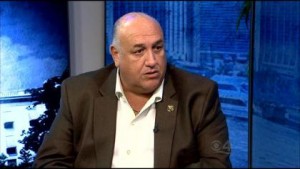Miami-Dade’s police union declared an impasse Monday in its long-running labor talks with the county, thrusting a high-profile contract dispute into the run-up to the 2016 mayoral election.
Union chief John Rivera said he told county negotiators that the Miami-Dade Police Benevolent Association, the labor group’s name, no longer saw a chance for the two sides to reach a deal in talks that began in 2014. By declaring an impasse, the PBA next will ask a state labor board to mediate between the union and the administration of Mayor Carlos Gimenez, Rivera said.
“We’re stuck in the mud,” Rivera said.
The impasse move could spark other unions to join police negotiators in throwing up their hands over labor talks now in their second year. There are 10 labor groups representing about 25,000 county workers covered by union deals, and in 2014 Gimenez secured new three-year contracts for five of them. That left the PBA’s two bargaining units, which also represent corrections employees, and unions representing workers for Water and Sewer, Transit and Fire.
One primary sticking point is the kind of raise PBA members would receive in 2017 under a new contract. The five unions that accepted contracts have provisions tying a potential four-percent raise to how much property-tax revenues increase as of July 1. The PBA wants a 4 percent raise, and administration officials expect property revenues to rise enough this summer to trigger a 4 percent increase anyway.
But Gimenez spokesman Michael Hernández said it would be irresponsible to gamble on property revenues meeting expectations and lock in raises now.
“They want a guarantee and we can’t guarantee,” he said. “We’re not going to repeat the same mistakes of previous administrations that over-promised, and then tax receipts went down.”
Gimenez first won office in 2011 after the recall of then-Mayor Carlos Alvarez, who presided over tax increases in part to cover union raises in the face of a real estate crisis that sent tax revenues plunging. Now Gimenez is running for a second four-year term, and is sure to face opposition from the PBA and other unions.
In a letter to members, Rivera slammed Gimenez for what the union president described as under-funding the police department and winning approval for a $1 million-a-yearimplementation of body cameras while other needs go unmet.
“He has us working short-handed, has displayed total disdain for our profession, is using the body cameras as a political tool, asks that we work with inferior equipment and decaying facilities, and is not willing to give us a fair contract,” Rivera wrote of Gimenez. “He simply is not willing to acknowledge our sacrifices and so we are at an impasse situation.”
Rivera also suggested union members shouldn’t go beyond what the police department’s operating procedures require of officers. “As we have said repeatedly please, don’t take unnecessary risks,” he wrote. “Going home has to be top priority.”
Should the impasse not be resolved by a state labor board, Miami-Dade’s 13-member county commission would be charged with approving a new contract for the police union. Last year, the PBA won a court fight stripping Gimenez of his authority to veto contracts approved by commissioners during an impasse, costing the mayor significant leverage in the ongoing union talks.
Hernández accused Rivera of holding a grudge against Gimenez rather than negotiating a responsible deal.
“It’s unfortunate that Rivera continues to put politics above police officers,” he said. “Miami-Dade’s finest deserve much better than what they’re getting from their union boss.”


